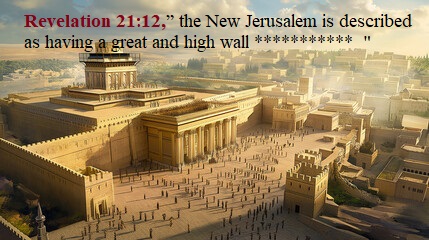
WHAT DOES THE BIBLE SAY ABOUT BUILDING WALLS?
“In this day and age, walls can be viewed with negative nuances but the truth with the matter is building walls is for many reasons, spiritually and physically. In the Christian belief, walls symbolizes divine protection spiritually for a faithful life and physically as boundaries for a peaceful environment on Earth for God’s people.
Physical boundaries are not a new norm in the world when we go back into history and it is always aligned with Biblical beliefs of the faithful ones and secularists alike.
“Overall, walls in the Bible carry rich and varied meanings, from literal structures of defense to powerful symbols of spiritual truths. They reflect the human need for security, the reality of division, and the hope of divine protection and unity.”
In Revelation 21:12,” the New Jerusalem is described as having a great and high wall with twelve gates, symbolizing the perfect and eternal security of God’s redeemed people.” [Bible Hub]
One of the most popular walls physically and divinely rebuilt from Biblical history was the wall of Jerusalem by Nehemiah. It is recorded that, after the Babylonian exile, Nehemiah was moved by God to return to Jerusalem and oversee the rebuilding of the city’s walls, which had been destroyed.
The book of Nehemiah 2:17 says: “Then I said to them, ‘You see the trouble we are in: Jerusalem lies in ruins, and its gates have been burned with fire. Come, let us rebuild the wall of Jerusalem, so that we will no longer be a disgrace,” and the walls were built for security and peace of the people.
Nonetheless, to some, walls can be seen as a source of imprisonment and division. They are often called things we need to break down and overcome.
However, when we look at walls in the Bible, they are also seen as structures that protect, provide security, and represent a place of peace, and shelter forming a sense of belonging. In the Old Testament, physical walls were built to serve as a deterrent vital for a city’s survival against intruders or enemies.
In the Christian life, walls are not only physical deterrent but also spiritual defense against attacks from the devil. So as spiritual walls of salvation and security are built through Christ our physical life must be protected by aligning it what the Bible say.
Critics on the other hand misinterpret Ezekiel 13:10 by using it as an excuse to support and justify their argument of tearing down of physical structure of walls whereas this is a spiritual statement warning false teachers and prophets – wall as a metaphor to say.
Exekiel 13:10-12 states: “Precisely because they have misled my people, saying, ‘Peace,’ when there is no peace, and because, when the people build a wall, these prophets smear it with whitewash,say to those who smear it with whitewash that it shall fall! There will be a deluge of rain, and you, O great hailstones, will fall, and stormy winds break out. And when the wall falls, will it not be said to you, ‘Where is the coating with which you smeared it?”
“In Acts 23, Paul stands before the Sanhedrin and is struck on the order of the high priest Ananias. In response, Paul exclaims, “God will strike you, you whitewashed wall! You sit there to judge me according to the law, yet you yourself violate the law by commanding that I be struck” (Acts 23:3). Here, Paul uses the term to denounce the hypocrisy of the religious leaders who outwardly uphold the law but inwardly act unjustly.”
“Paul’s rebuke highlights the theme of God’s wrath against those who maintain an outward appearance of righteousness while engaging in unrighteous actions. The whitewashed wall serves as a metaphor for the superficial piety that God condemns, emphasizing the importance of genuine faith and integrity.” Stand firm in your FAITH and HOPE for your blessings.
// SHARE //
